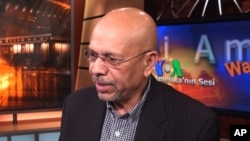NATO members are meeting in Brussels to consider military options in response to the growing crisis in Libya. One of NATO's chief concerns is how to impose a no-fly zone without descending into all-out war.
Ali Suleiman Aujali recently resigned his post as Libyan ambassador to the United States, but he remains in Washington on behalf of the newly-formed Interim National Transitional Council. VOA’s Cecily Hilleary sat down with Aujali in our studios and spoke to him about the issue of a no-fly zone and other challenges facing Libya today.
|
Listen to the full interview with Ambassador Aujali:
|
Aujali: You know the problem the uprising is facing now – they are facing the air superiority of [Libyan leader Moammar] Gadhafi. And the other challenge is the shortage of rebels. Of course, they are not professional fighters. They are young people, students, doctors and lawyers. We have no soldiers supporting the revolution, except for the soldiers who quit the Gadhafi regime.
We need protection, but our people will fight. But protection must be provided by the international community. We must paralyze the Gadhafi superiority in the air. The world must do something. There are options on the table. They have to pick one which would stop Gadhafi killing his own people.
Hilleary: The no-fly zone is not a simple matter though. In order to stop Libyan airstrikes, you have to strike at the Libyan air defense and you also need to hit the missile sites on the ground.
Aujali: If the international community, the European Union and the United States want to do it, they can do it. If they don’t want to do it, then they make [the situation] very complicated. This regime [Gaddhafi’s] would not be able to [put up any resistance] if there was one strike or two. They would collapse.
|
Cecily Hilleary’s debriefer with Susan Yackee with additional insights into her interview with Ambassador Aujali:
|
Hilleary: Mr. Gadhafi has said that if we take any action, Libyans are prepared to take up arms.
Aujali: How can Gadhafi – he failed to control his own country and he is going to fight the West? He blackmailed the West with [the threat of a deluge of] illegal immigrants, he blackmailed the West with al-Qaida, their fighting in Libya, and unfortunately there are some countries that believe what he’s saying. But this is not true. Libya has never been a home to al-Qaida.
The Libyan society is a very open society, a very compassionate society. And when he said “al-Qaida,” everybody [listened] up, especially in the West, and he used this word to make the West worried. Now, the Gadhafi regime is preparing boats and sending ordinary African people who came to work in our country and sends them [off to other countries], saying – look, if I’m not here, this is the challenge you are going to be facing. Europe, I think, does understand [this trickery], and I hope they will be more serious [in the effort] to stop Gadhafi.
Hilleary: NATO has said it is not going in without U.N approval, and the U.S. is saying the same thing, but two key votes on the U.N. Security Council are likely to veto any action.
Aujali: If the United Nations cannot do it, I think NATO can do it.
Hilleary: NATO is reluctant, though.
Aujali: Then they will regret [this], because what are they waiting for? Everyday day that Gadhafi is in power [longer], this means killing. Everyday day that Gadhafi is in power [longer], he is controlling the air. He is taking no [risks] now when he strikes, because there is no action [in response]. What is the international community waiting for? Srebrenica? Rwanda? And then what will happen? They will come on TV and say how sorry they are for this to have happened.




